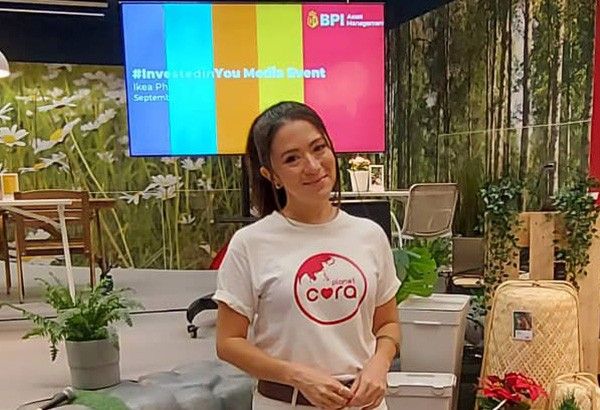Antoinette Taus recalls heartbreak that made her an environmentalist

MANILA, Philippines — In the ‘90s, Antoinette Taus was a household name, having released hit singles like “Lihim na Pagtingin” and starred in cult TV shows such as “T.G.I.S.” and “Click.”
But in 2004, Antoinette’s world crumbled — and it's not because of an actor who was romantically linked to her as her love team partner in a TV series.
“I wasn’t really exposed to being an environmentalist,” the singer-actress recalled in a recent media launch introducing her as the new endorser of Bank of the Philippine Islands’ (BPI) “Invested in You” campaign.
“My mom was all about charitable causes. Actually, Cora was my mom’s name… We lost her 2004 to cancer and I also have a longer version of that story.”
After she lost her mom, she fell into depression that challenged her mental health.
As a way to cope from losing her mom, she and her friends and family organized a feeding program.
“I said, hey, I’ll just do it one time and just for special occasions and it turned into a big thing. We posted on social media and it gained traction. We were so shocked! So within a year, we became a full-fledged nonprofit,” Taus shared of the origins of the organization she founded and named after her mom.
CORA (Communities Organized for Resource Allocation) is a non-profit organization dedicated to creating sustainable programs that empower volunteers, women and the youth, in contributing to the solutions to the world's most pressing social and environmental issues.
As Goodwill Ambassador for the United Nations Environment Programme (UNEP), Antoinette is also the founder of The Sustainable Planet, a purpose-driven business centered on improving the lives of Indigenous Peoples, women, and vulnerable Filipino communities through various livelihood programs.
Antoinette passionately advocates for the United Nations (UN) Sustainable Development Goals (SDGs), speaking about urgent global challenges pertaining to plastic pollution, climate change, gender equality, mental health, and sustainability. During the BPI launch, Taus rapped for the first time and performed her own version of UN SDGs.
WATCH: Antoinette Taus raps UN SDGs
Apart from impacting the lives of hundreds of thousands of beneficiaries, Taus has become so engrossed with CORA because she personally loves forests and oceans, which is why they organize many beach clean-ups.
“What can we do? We’re not scientists, we’re not experts. What can we possibly do to make a difference? Well, first and foremost, we can help by not litter, but we can actually clean up litter!” she enthused.
Related: 'Citizen-scientists' pick up trash, help collect data on International Coastal Clean-Up Day
Advocating beyond cleaning
But cleaning is not a permanent solution, said Taus. “It’s just one of the first steps because we have so many problems out there, but also, recycling them is what brings us to a sustainable future and a circular economy.”
On the personal level, being eco-friendly, said Taus, also means a lifestyle makeover, which includes being physically active, going for cleaner choices like a plant-based diet, electric vehicles, and ethical shopping and investing.
Whether it is buying clothes or stocks, she said, “Don’t just buy just because it’s pretty; do more research and think where your money goes.”
Before investing, she advised asking if the companies are really into helping people and the planet and/or using renewable energy.
“Investing in the right brands, and even in things that we purchase, the services that we actually choose, participate in, matters so much,” she stressed.
Related: Wealth creation 101: 3 expert tips for short to long-term investing
She also recommended slow traveling – “Take it slow, instead of taking the plane, you go by land, take the boat, go somewhere local, go for hidden gems – stay curious and choose experiences that promote exchange of learning between you and the community.”
Realizing that there are many waste management issues deeply embedded in communities, CORA recently partnered with barangays to encourage people to exchange recyclable materials for electronic cash.
CORA’s WoMangrove Warriors project in Leyte, meanwhile, mobilizes women to plant, grow and maintain mangroves to help communities, reduce carbon dioxide in the atmosphere, and increase biodiversity in Leyte since Leyte and Samar are two of the parts of the country worst hit by natural disasters.
“Sadly, the Philippines has been widely known as the, one of the, the numbers go up and down the charts… We always ranked as among the one, two, three when it comes to becoming impacted by climate change, typhoons and weather events. And 75% of deaths across the Southwest Pacific region is actually being attributed to our country alone,” she claimed.
“And it’s really sad when you think of it because it’s not just the climate change, the weather. It’s lives being lost and taken because of the degraded land. Because of the air that is not protected.”
Likewise, CORA is into tapping communities to help produce sustainable and eco-friendly products. These include women making bags from used flour sacks acquired from bakeries across the country – and they help not just by cleaning the environment, but also through promoting livelihood and empowering women.
“To empower women does not mean that women are weak or are in need of help,” Taus clarified. “It means we acknowledge that we need women to take a big part in who and what we are today.”
Indeed, from her mom, Cora, who made Antoinette who she is today, to CORA, the organization that has engaged so many families, schools and businesses and is transforming them into what they are today and in the future, Antoinette has found a new mother to love and care for – the Earth.
“Taking care of our planet is not separate from taking care of ourselves and each other,” she mused.
“Everything is interconnected – intersectional!”



















